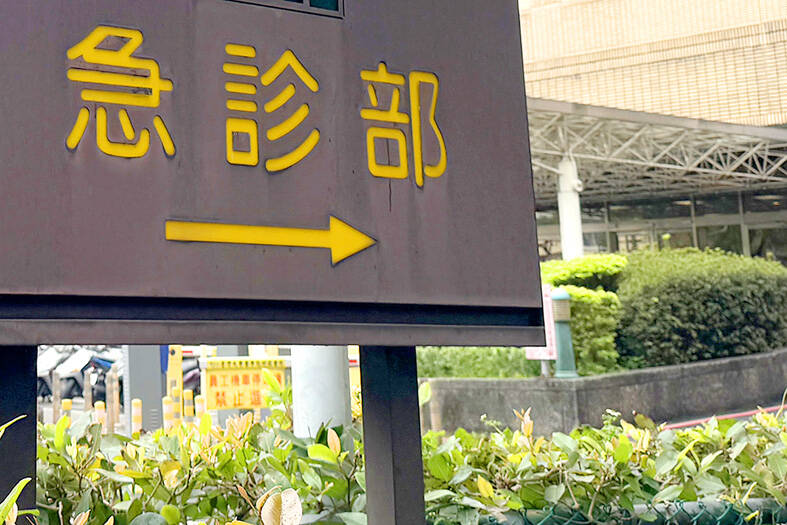Fees for emergency room visits, nursing and beds are to be increased by May at the earliest to address overcrowding, raising National Health Insurance (NHI) expenditure by more than NT$4 billion (US$121.82 million) annually, the National Health Insurance Administration announced yesterday.
The agency met yesterday to discuss strategies to alleviate emergency room overcrowding and nursing staff shortages.
Emergency room consultation and nursing fees would increase by 10 percent, while emergency bed nursing fees would rise by 60 percent, agency Director-General Shih Chung-liang (石崇良) said after the meeting.

Photo: Chiu Chih-jou, Taipei Times
Nursing fees are currently included in consultation fees for emergency room visits, but after the changes, physician consultation fees and nursing fees would be paid separately, with both increasing by 10 percent depending on the severity of the patient’s condition, Shih said.
For example, for Category 1 triage cases, the consultation fee would rise from NT$1,223 to NT$1,345, and the nursing fee would rise from NT$577 to NT$635, Shih said.
This is expected to add NT$730 million annually to NHI expenditures, he said.
The two fees would also be paid separately for emergency room observation beds, with the physician’s fee set at NT$468 per consultation, the same as for beds in hospital wards, Shih said.
Nursing fees would increase by 60 percent, reaching 90 percent of the nursing fees for acute general beds, he said.
The fee for the first day would increase from NT$571 to NT$914, and the fee for the second day would rise from NT$175 to NT$703, he said.
This is expected to add NT$430 million annually to NHI expenditures, he said.
Regarding intensive care unit (ICU) fees in emergency-responsible hospitals, fees for high-severity hospitals would be adjusted to match those of medical centers, while fees for moderate-severity hospitals would be similar to regional hospitals, Shih said.
It is estimated that 25 regional hospitals and one district hospital would have fees adjusted to those of medical centers, while 26 district hospitals would have fees adjusted to those of regional hospitals, he said.
This would help more hospitals share the burden of emergency patient care and is expected to add NT$590 million annually to NHI expenditures, he said.
Nursing fees for general wards would also be adjusted, Shih said.
The initial plan is to invest NT$2.5 billion to improve the nursing workforce and prioritize increasing nursing fees for acute general beds, he said.
Hospitals must meet certain requirements before receiving additional subsidies, including increasing nurses’ salaries, lowering the emergency room retention rate and sending more critical patients from the emergency room to the ICU, Shih said.
The goal is to resolve the issue of emergency patients being unable to transfer to hospital wards, preventing prolonged stays in the emergency room and reducing the strain on the healthcare system, he said.
The planned adjustments are to be reviewed during the hospital budget meeting this month and further discussed later this month, Shih said.
The changes are expected to be implemented in May at the earliest, he said.

Rainfall is expected to become more widespread and persistent across central and southern Taiwan over the next few days, with the effects of the weather patterns becoming most prominent between last night and tomorrow, the Central Weather Administration (CWA) said yesterday. Independent meteorologist Daniel Wu (吳德榮) said that based on the latest forecast models of the combination of a low-pressure system and southwesterly winds, rainfall and flooding are expected to continue in central and southern Taiwan from today to Sunday. The CWA also warned of flash floods, thunder and lightning, and strong gusts in these areas, as well as landslides and fallen

WAITING GAME: The US has so far only offered a ‘best rate tariff,’ which officials assume is about 15 percent, the same as Japan, a person familiar with the matter said Taiwan and the US have completed “technical consultations” regarding tariffs and a finalized rate is expected to be released soon, Executive Yuan spokeswoman Michelle Lee (李慧芝) told a news conference yesterday, as a 90-day pause on US President Donald Trump’s “reciprocal” tariffs is set to expire today. The two countries have reached a “certain degree of consensus” on issues such as tariffs, nontariff trade barriers, trade facilitation, supply chain resilience and economic security, Lee said. They also discussed opportunities for cooperation, investment and procurement, she said. A joint statement is still being negotiated and would be released once the US government has made

SOUTH CHINA SEA? The Philippine president spoke of adding more classrooms and power plants, while skipping tensions with China over disputed areas Philippine President Ferdinand Marcos Jr yesterday blasted “useless and crumbling” flood control projects in a state of the nation address that focused on domestic issues after a months-long feud with his vice president. Addressing a joint session of congress after days of rain that left at least 31 dead, Marcos repeated his recent warning that the nation faced a climate change-driven “new normal,” while pledging to investigate publicly funded projects that had failed. “Let’s not pretend, the people know that these projects can breed corruption. Kickbacks ... for the boys,” he said, citing houses that were “swept away” by the floods. “Someone has

‘CRUDE’: The potential countermeasure is in response to South Africa renaming Taiwan’s representative offices and the insistence that it move out of Pretoria Taiwan is considering banning exports of semiconductors to South Africa after the latter unilaterally downgraded and changed the names of Taiwan’s two representative offices, the Ministry of Foreign Affairs (MOFA) said yesterday. On Monday last week, the South African Department of International Relations and Cooperation unilaterally released a statement saying that, as of April 1, the Taipei Liaison Offices in Pretoria and Cape Town had been renamed the “Taipei Commercial Office in Johannesburg” and the “Taipei Commercial Office in Cape Town.” Citing UN General Assembly Resolution 2758, it said that South Africa “recognizes the People’s Republic of China (PRC) as the sole